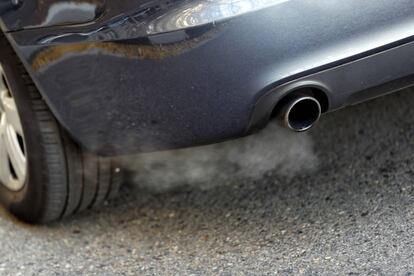Pollution causing 30,000 early deaths a year in Spain, says EU report
European Environment Agency points to a rise in premature mortality due to dirty air across Europe

Air pollution caused an estimated 29,980 premature deaths in in Spain in 2013 according to the Air quality in Europe – 2016 report released by the European Environment Agency (EEA) on Wednesday. This number, based on data obtained from official monitoring stations around Europe, marks a slight downturn on the EEA’s 2012 estimate for deaths in Spain of 33,200.

For the European Union (EU) as a whole, the total number of deaths attributable to exposure to fine particulate matter (PM2,5), ground-level ozone (O3) and nitrogen dioxide (NO2) was nearly 520,000 in 2013, up from 491,000 a year earlier.
In terms of individual contaminants, the EEA stressed that PM2,5, linked to traffic and diesel fuel, was responsible for most pollution-related deaths in 2013, both in the EU as a whole and Spain in particular.
We need to tackle the root causes of air pollution, transforming mobility, energy and food systems EEA
Germany (73,400 deaths), Italy (66,630 deaths), France (45,120) and Poland (48,270) headed up the list of countries with most early deaths linked to exposure to PM2,5 in 2013. The EEA put the number of such deaths in Spain at 23,940 in that year. For the EU, the total figure was 436,000.
The ozone problem
The EEA study stresses that Italy, Germany, France, Spain and Poland are most affected when it comes to early deaths related to O3 exposure. This exposure was the cause of 1,760 deaths in Spain in 2013 according to the environmental watchdog.
A recent study by the green group Ecologists in Action stated that from 2014 to 2016, 10.2 million Spaniards, or 21.8% of the population, lived in areas where legal exposure to O3 limits was exceeded. While levels for other contamination have dropped during Spain’s long economic crisis, this has not been the case with O3. This gas is not produced directly during the burning of fossil fuels or through industrial processes. However, these activities generate precursors which – in combination with solar radiation – form ozone in the lower layers of the atmosphere.
The third contaminant analyzed by the EEA was NO2, which is also related to traffic. This was estimated to be responsible for 4,280 premature deaths in Spain in 2013 while the figure for 41 countries studied by the EEA was 71,000.
“Emission reductions have led to improvements in air quality in Europe, but not enough to avoid unacceptable damage to human health and the environment,” said EEA Executive Director Hans Bruyninckx on the release of the study.
Early deaths due to exposure to ground-level ozone have not fallen during Spain's economic crisis
“We need to tackle the root causes of air pollution, which calls for a fundamental and innovative transformation of our mobility, energy and food systems. This process of change requires action from us all, including public authorities, businesses, citizens and the research community.”
In Spain, Madrid has the worst record for air pollution levels, and one of the blackest spots is the area around its central Retiro Park. Other cities with areas that consistently show dangerously high levels of air pollution are Barcelona, Granada, Palma de Mallorca and Bilbao, according to Spain’s Environment Ministry.
In early November, Madrid unveiled draft proposals aimed at cleaning up the city’s air including a possible ban on the cars of non-residents in the city center.
English version by George Mills.
Tu suscripción se está usando en otro dispositivo
¿Quieres añadir otro usuario a tu suscripción?
Si continúas leyendo en este dispositivo, no se podrá leer en el otro.
FlechaTu suscripción se está usando en otro dispositivo y solo puedes acceder a EL PAÍS desde un dispositivo a la vez.
Si quieres compartir tu cuenta, cambia tu suscripción a la modalidad Premium, así podrás añadir otro usuario. Cada uno accederá con su propia cuenta de email, lo que os permitirá personalizar vuestra experiencia en EL PAÍS.
¿Tienes una suscripción de empresa? Accede aquí para contratar más cuentas.
En el caso de no saber quién está usando tu cuenta, te recomendamos cambiar tu contraseña aquí.
Si decides continuar compartiendo tu cuenta, este mensaje se mostrará en tu dispositivo y en el de la otra persona que está usando tu cuenta de forma indefinida, afectando a tu experiencia de lectura. Puedes consultar aquí los términos y condiciones de la suscripción digital.








































